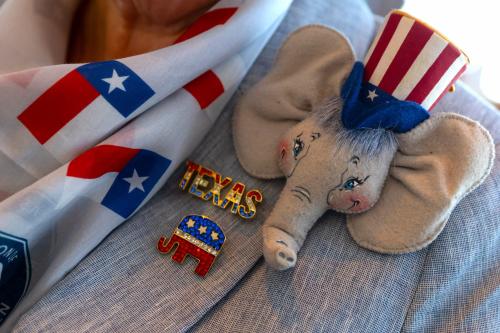As the Iowa caucuses loom, we do not know whether the raw support Donald Trump is registering in public opinion surveys will translate into actual votes. Still, the level of support he enjoys has surged during the past month. Something is happening.
The most familiar part of the story is Trump’s mobilization of the disaffected white working class, many of whom are independents or even Democrats, and few of whom are regular caucus-goers. Over the past week, moreover, many members of the Republican establishment in Iowa as well as Washington have concluded that he represents less of a threat than does Texas Senator Ted Cruz.
Third—and even more surprising—support for Trump among white evangelical Protestants has increased dramatically and could prove decisive in Iowa, where evangelicals make up 26 percent of the state population, compared to 17 percent nationally, and 42 percent of Republicans, versus 35 percent among Republicans nationwide. According to a new poll by the Public Religion Research Institute, since November evangelical approval of Trump has increased by 16 percentage points, from 37 to 53 percent. Another new poll, this one from the Pew Research Center, finds that 52 percent of evangelical voters believe Trump would be a good or great president.
This is surprising (one might even say amazing) for a number of reasons. Evangelicals are more likely than are other Republicans to prefer candidates who share their religious beliefs. Trump doesn’t, but many evangelicals who know that he doesn’t back him anyway.
This is part of a broader pattern among Republicans overall, two-thirds of whom say they want a religiously compatible candidate. Fully 80 percent of Republicans see Ben Carson as very or somewhat religious, compared to 76 percent for Ted Cruz, 70 percent for Marco Rubio—and only 44 percent for Trump. But of the 56 percent of Republicans who think that Trump would be a good or great president, almost one-third regard him as not too religious or not at all religious.
The paradox goes deeper than general religious compatibility. Fully 56 percent of white evangelical Protestants say they would be less likely to support to support a candidate who had an extra-marital affair. Trump has had more than one and has bragged about them in public and in print.
To be sure, evangelicals are famously willing to embrace penitent sinners. But repentance is not part of Trump’s theological repertoire. Last year, Republican pollster Frank Luntz asked him whether he had ever asked God for forgiveness. “I’m not sure I have,” Trump replied. “If I do something wrong, I think, I just try and make it right. I don’t bring God into that picture.”
Earlier this month, Trump came close to retracting the admission that he ever did anything wrong. “I like to be good,” he told Jake Tapper. “And I am good. I don’t do a lot of things that are bad.” There is some daylight between these reflections and the Sermon on the Mount. Nonetheless, Trump asserted, “I have a great relationship with God. [And] I have a great relationship with the evangelicals.” Thus far, survey research has been able to confirm only the latter assertion.
The latest NBC News/Survey Monkey weekly online poll showed Trump with 37 percent of the white Republican evangelical voters nationally, compared to Ted Cruz at 20 percent. By contrast, according to the latest Quinnipiac survey, Cruz leads Trump by 39 to 27 percent among Iowa evangelicals who are likely to participate in the Republican caucuses. Cruz’s prospects—and the entire trajectory of the Republican presidential nominating contest—depends on his ability to maintain a double-digit margin among this crucial bloc of Iowa Republicans. But if Trump can persuade them to place personal charisma ahead of virtuous conduct and theological correctness, he may well be unstoppable.


Commentary
Trump’s inexplicable support among evangelical voters may be decisive in Iowa
January 28, 2016